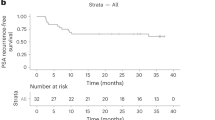Summary
A role for CD20 antibodies in treating prostate cancer has not yet been established. We report a case of advanced prostate cancer presenting with generalized lymphadenopathy that expressed CCR7 and CD20. CCR7 expression in prostate cancer has been previously reported only once; the expression of CD20 has not been reported before. Rituximab therapy was initiated in this case and resulted in a significant biochemical response. This unique metastatic and biochemical pattern may signify a distinct subtype of prostate cancer that may be amenable to treatment with anti-CD20 antibodies.





Similar content being viewed by others
References
Oster MW, Wolff M, Starrett S (1979) Prostate cancer mimicking malignant lymphoma. Med Pediatr Oncol 7:387–392
Stein BS, Shea FJ (1983) Metastatic carcinoma of the prostate presenting radiographically as lymphoma. J Urol 130:362–364
Liel Y, Biderman A, Biran C et al (1987) Carcinoma of the prostate clinically and radiologically simulating malignant lymphoma. J Surg Oncol 35:113–116
Phillips SM, Ferry DR, Lee SJ (1994) Carcinoma of the prostate mimicking lymphoma. Br J Urol 73:590–591
Ahn MJ, Oh SJ, Lee YY et al (1997) A case of prostate cancer in 34 year old man presenting with generalized lymphadenopathy mimicking malignant lymphoma. J Korean Med Sci 12:262–265
Oyan B, Engin H, Yalcin S (2002) Generalized lymphadenopathy: a rare presentation of disseminated prostate cancer. Med Oncol Northwood Lond Engl 19:177–179. doi:10.1385/MO:19:3:177
Biyani CS, Basu S, Bottomley DM, Shah TK (2003) Prostatic adenocarcinoma masquerading as lymphoma and presentation with axillary-subclavian vein thrombosis. Urol Oncol 21:3–6
Heresi GA, Wang J, Taichman R et al (2005) Expression of the chemokine receptor CCR7 in prostate cancer presenting with generalized lymphadenopathy: report of a case, review of the literature, and analysis of chemokine receptor expression. Urol Oncol 23:261–267. doi:10.1016/j.urolonc.2005.02.004
Moura FM, Garcia LT, Castro LPF, Ferrari TCA (2006) Prostate adenocarcinoma manifesting as generalized lymphadenopathy. Urol Oncol 24:216–219. doi:10.1016/j.urolonc.2005.06.022
Saad S, Hayek T, Vlodavsky E, et al. Generalized lymphadenopathy as the first manifestation of prostatic cancer. Gd Rounds 10:67–70.
Benderli-Cihan Y, Deniz K, Sofikerim M (2011) A Case of Prostate Adenocarcinoma In A 67-Year-Old Man Manifesting As Generalized Lymphaenopathy Mimicking Lymphoma. Kulak Burun Boğaz Ihtis Derg KBB J Ear Nose Throat 14:381–385
Cetin B, Cetin Z, Buyukberber S et al (2011) Generalized lymphadenopathy: unusual presentation of prostate adenocarcinoma. Case Rep Urol 2011:439732. doi:10.1155/2011/439732
Krpina K, Oguic R, Pavlovic I et al (2011) Prostate cancer manifesting as generalized lymphadenopathy. Rev Rom Urol 10:72–74
Andre F, Cabioglu N, Assi H et al (2006) Expression of chemokine receptors predicts the site of metastatic relapse in patients with axillary node positive primary breast cancer. Ann Oncol Off J Eur Soc Med Oncol ESMO 17:945–951. doi:10.1093/annonc/mdl053
Kakinuma T, Hwang ST (2006) Chemokines, chemokine receptors, and cancer metastasis. J Leukoc Biol 79:639–651. doi:10.1189/jlb.1105633
Zlotnik A, Burkhardt AM, Homey B (2011) Homeostatic chemokine receptors and organ-specific metastasis. Nat Rev Immunol 11:597–606. doi:10.1038/nri3049
Gladson CL, Welch DR (2008) New insights into the role of CXCR4 in prostate cancer metastasis. Cancer Biol Ther 7:1849–1851
Taichman RS, Cooper C, Keller ET et al (2002) Use of the stromal cell-derived factor-1/CXCR4 pathway in prostate cancer metastasis to bone. Cancer Res 62:1832–1837
López-Giral S, Quintana NE, Cabrerizo M et al (2004) Chemokine receptors that mediate B cell homing to secondary lymphoid tissues are highly expressed in B cell chronic lymphocytic leukemia and non-Hodgkin lymphomas with widespread nodular dissemination. J Leukoc Biol 76:462–471. doi:10.1189/jlb.1203652
Alfonso-Pérez M, López-Giral S, Quintana NE et al (2006) Anti-CCR7 monoclonal antibodies as a novel tool for the treatment of chronic lymphocyte leukemia. J Leukoc Biol 79:1157–1165. doi:10.1189/jlb.1105623
O’Hayre M, Salanga CL, Kipps TJ et al (2010) Elucidating the CXCL12/CXCR4 signaling network in chronic lymphocytic leukemia through phosphoproteomics analysis. PloS One 5:e11716. doi:10.1371/journal.pone.0011716
Yang J, Wang S, Zhao G, Sun B (2011) Effect of chemokine receptors CCR7 on disseminated behavior of human T cell lymphoma: clinical and experimental study. J Exp Clin Cancer Res CR 30:51. doi:10.1186/1756-9966-30-51
Buonamici S, Trimarchi T, Ruocco MG et al (2009) CCR7 signalling as an essential regulator of CNS infiltration in T-cell leukaemia. Nature 459:1000–1004. doi:10.1038/nature08020
Ammirante M, Luo J-L, Grivennikov S et al (2010) B-cell-derived lymphotoxin promotes castration-resistant prostate cancer. Nature 464:302–305. doi:10.1038/nature08782
Oosterheert JJ, Budel LM, Vos P, Wittebol S (2007) High levels of serum prostate-specific antigen due to PSA producing follicular non-Hodgkin’s lymphoma. Eur J Haematol 79:155–158. doi:10.1111/j.1600-0609.2007.00883.x
Djavan B, Keffer JH, Molberg K, Roehrborn CG (1995) False-positive serum prostate-specific antigen values in a patient with non-Hodgkin lymphoma of the kidney. Urology 45:875–878. doi:10.1016/S0090-4295(99)80099-5
Nadler RB, Humphrey PA, Smith DS et al (1995) Effect of inflammation and benign prostatic hyperplasia on elevated serum prostate specific antigen levels. J Urol 154:407–413
Wiernik PH (2008) Serum CA125 and PSA concentrations in patients with lymphoma. Clin Adv Hematol Oncol HO 6:527–531
Terris MK, Hausdorff J, Freiha FS (1997) Hematolymphoid malignancies diagnosed at the time of radical prostatectomy. J Urol 158:1457–1459
Sella A, Konichezky M, Flex D et al (2000) Low PSA metastatic androgen-independent prostate cancer. Eur Urol 38:250–254
Tu S-M, Reyes AO, Fanning T et al (2002) Advanced prostate carcinoma and elevated serum CA-125 level 31. J Clin Oncol Off J Am Soc Clin Oncol 21:2445
Cancer Genetics. http://www.cancerindex.org/geneweb/clinkc17.htm (Accessed, September, 2013).
Liede A, Karlan BY, Narod SA (2004) Cancer risks for male carriers of germline mutations in BRCA1 or BRCA2: a review of the literature. J Clin Oncol Off J Am Soc Clin Oncol 22:735–742. doi:10.1200/JCO.2004.05.055
Acknowledgments
We gratefully acknowledge Dr. Alastair Deery for the pathology processing that contributed to the development of the article.
Competing interests
Moshe Rogosnitzky has a pending patent for the use of CD20 antibodies in treating prostate cancer
Author information
Authors and Affiliations
Corresponding author
Rights and permissions
About this article
Cite this article
Dalgleish, A., Featherstone, P., Vlassov, V. et al. Rituximab for treating CD20+ prostate cancer with generalized lymphadenopathy: a case report and review of the literature. Invest New Drugs 32, 1048–1052 (2014). https://doi.org/10.1007/s10637-014-0063-z
Received:
Accepted:
Published:
Issue Date:
DOI: https://doi.org/10.1007/s10637-014-0063-z




